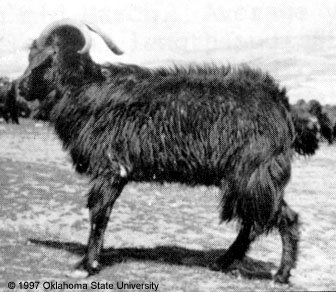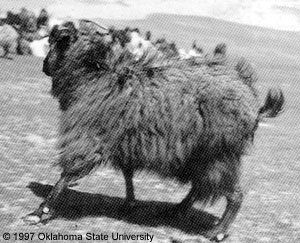Uzbek Black Goats
 Black wool goats in Uzbekistan were produced as a by-product in the formation of the
new breed - Soviet Mohair goats. Mating of predominantly white first and second generation
crossbred females with purebred white Angora males resulted in the appearance of 1-2%
of black kids.
Black wool goats in Uzbekistan were produced as a by-product in the formation of the
new breed - Soviet Mohair goats. Mating of predominantly white first and second generation
crossbred females with purebred white Angora males resulted in the appearance of 1-2%
of black kids.
After 4-5 years, there were already several hundred black wool goats; they were gathered into one herd and females were mated only to black males. Such mating produced in the first year 64% and in the second 74% of black kids; others were white, tan, grey, etc. Later, due to positive assortative mating, it was possible to obtain 94% of black kids.
The black goats are similar to Don goats in such aspects as fleece structure, physical properties of wool fibres and productivity. In contrast to Orenburg goats, which have long guard hairs and very short wool fibres, Uzbek goats have wool fibres longer than guard hairs, except along the spine where the latter are very long. Hair is not shed in spring but wool is shed abundantly, starting from the first warm spring days when goats pass to grass feeding.
 Wool is combed out selectively at the time of moulting and, as a rule, only once,
in mid-March. Average yields per head in collective farms vary from 280 to 440 g.
While the length and fineness of fibres depend on the level and quality of feeding,
wool yields are actually determined by the time of combing out the moulting fibres.
Shedding is very rapid and 5-10 days delay in combing results in 20-40% loss irrespective
of age. The extreme limits are 6 and 12 cm in females and even more in males. Fibre
diameter is within the range 15-24 µm; the average for females is 19 and for males
22 µm. In the young, wool is 1-2 µm finer than in adults.
Wool is combed out selectively at the time of moulting and, as a rule, only once,
in mid-March. Average yields per head in collective farms vary from 280 to 440 g.
While the length and fineness of fibres depend on the level and quality of feeding,
wool yields are actually determined by the time of combing out the moulting fibres.
Shedding is very rapid and 5-10 days delay in combing results in 20-40% loss irrespective
of age. The extreme limits are 6 and 12 cm in females and even more in males. Fibre
diameter is within the range 15-24 µm; the average for females is 19 and for males
22 µm. In the young, wool is 1-2 µm finer than in adults.
The state farm Baisun in Namangan region of Uzbeckistan has a goat herd of 10,000 head and is considered one of the best enterprises for raising black wool goats. Average wool yields are 450 g from females, 700 g from males and 600 g from castrates. Wool goat husbandry in this state farm is very profitable and cost-effective.
References
Dmitriez, N.G. and Ernst, L.K. (1989) Animal Genetic Resources of the USSR. Animal Production and Health Paper Publ. by FAO, Rome, 517 pp.
